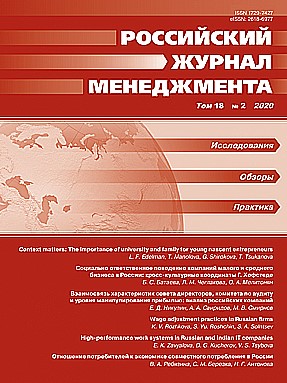The relationship of board of directors, audit committee and earnings management: Analysis of Russian public companies
DOI:
https://doi.org/10.21638/spbu18.2020.203Abstract
Using the sample of Russian public companies, this paper analyzes the relationship between the level of earnings management and several characteristics of the board of directors, the key element of the firm’s corporate governance. A particular attention is devoted to the audit committee — its structure and the characteristics of its members. The object of the study are 184 Russian public companies for 2014-2018. The analysis demonstrates the inverse relationship between the magnitude of earnings management and several attributes of the board of directors — its size, presence of the audit committee, the proportion of independent directors on Board. A similar type of relationship is revealed at the level of the audit committee for the proportion of independent directors in the committee and the presence of financial experts in the committee. At the same time, there is a positive relationship between the number of directorships positions of the audit committee members and the magnitude of earnings management. The results indicate that several characteristics of corporate governance might have a potential for restraining earnings management in Russian public companies.
Keywords:
earnings management, board of directors, audit committee, corporate governance, Russia
Downloads
References
REFERENCES IN LATIN ALPHABET
Translation of references in Russian into English
Downloads
Published
How to Cite
Issue
Section
License
Articles of the Russian Management Journal are open access distributed under the terms of the License Agreement with Saint Petersburg State University, which permits to the authors unrestricted distribution and self-archiving free of charge.





